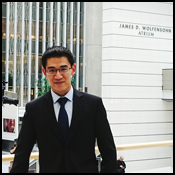
Meet Edmund Bao, who recently returned from Washington, D.C. after being the 2014 recipient of the ANU World Bank Fellowship. Edmund is in his final year of an undergraduate commerce/law degree from the Australian National University. In this week's guest blog, we interview Edmund about the World Bank Fellowship and his tips for future applicants.
What is the World Bank Fellowship?
It is a scholarship which supports an undergraduate or postgraduate law student to spend two months working at the World Bank’s headquarters in Washington D.C., in the Integrity Vice Presidency’s Special Litigation Unit. The Special Litigation Unit consists of lawyers and investigators who prosecute various instances of fraud and corruption in Bank sponsored development projects around the world. The SLU investigates and reports to the Sanctions Board, which can then impose sanctions on particular companies and/or individuals.
What were some of the highlights of your experience?
To me, two things stand out in particular. First, the multi-jurisdictional nature of the work itself. I worked on cases from a variety of different countries and legal systems. For example, they included issues of rogue agency in Ukraine’s reform of its banking system, cartel conduct and corruption in infrastructure projects in the Philippines, as well as bribery allegations in Mongolian environment projects. Other highlights involved dealing with issues of res judicata in the context of administrative sanctions, jurisdictional immunities and also national referral complications. A particularly challenging case involved forged experience certificates in the tendering and procurement of Vitamin A Pills in Bangladesh.
The second aspect that was very interesting involved gaining an insight into human behavior in the context of fraud and corruption. Whether the case originated from countries on opposite sides of the globe – the pattern of conduct was very similar. Be it a shareholder agreement, company memo or even an email chain – the essential elements were always present in one form or another. It is an adversarial rather than inquisitorial exercise – you are trying to find something that some extremely smart and powerful individuals have tried very hard to hide. Equally fascinating was the enormous creativity in the range of responses from companies seeking to justify and explain away their behavior in order to avoid sanctions!
What did you do outside of work?
There were extensive opportunities to meet with a wide range of politicians at various events on Capitol Hill. Highlights included speaking to Julie Bishop on Australia’s foreign strategic policy, or hearing Wayne Swan recounting his meeting with global finance ministers in the immediate aftermath of the GFC. I also spoke with US senators and congressional members on their experiences in politics and law. Lastly, an eye-opening experience was the opportunity to judge alongside a commercial arbitration panel with the vice-president of the European Court of Arbitration. Then there were the numerous monuments and memorials that I visited in DC, and the Smithsonians. A colleague and I also made a trip up to New York that was fantastic.
What did you take away from the overall experience?
To me, those experiences increased my understanding of the intersection between commercial law and corruption in the context of multilateral development projects. In particular, it highlighted the often harrowing consequences of corruption. I’ll always remember the image of a dozen faulty incubators delivered to an African hospital with covers missing and rust permeating the monitoring equipment. Finally, I’m grateful of the opportunity and privilege to learn from, and work with some amazing and highly intelligent people over there, many of whom have since become close friends.
What advice would you have for law students who wish to apply?
I would echo the advice given by Hannah Bathula (the inaugural recipient): to be yourself and let it come across in the selection process. A genuine interest in the type of work undertaken by the World Bank is also important. Ultimately, the people who work there are a very close-knit and supportive group of individuals. The selection process can be demanding, however the experience is well worth it.
Tips for the successful applicant?
Bring warm clothes. Canberra’s winter cannot compare to the -20 degrees in addition to the wind-chill. Also, join the Washington DC Snowball Fight Association on Facebook – you can thank me later!
Edmund’s Linkedin profile can be found here: www.linkedin.com/in/edmundbao
The ANU College of Law will be holding an information session on the World Bank Fellowship on Thursday 21 May at 5pm in the Philippa Weeks Staff Library. More information here: http://law.anu.edu.au/scholarships/world-bank-scholarship
